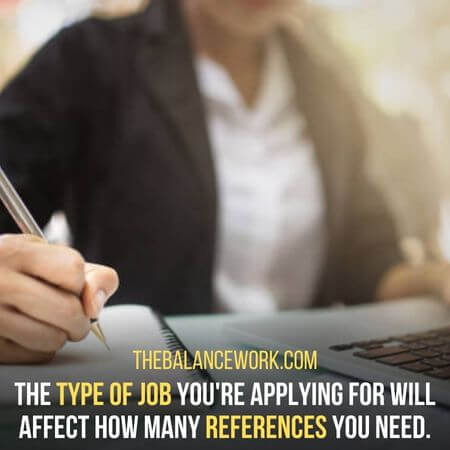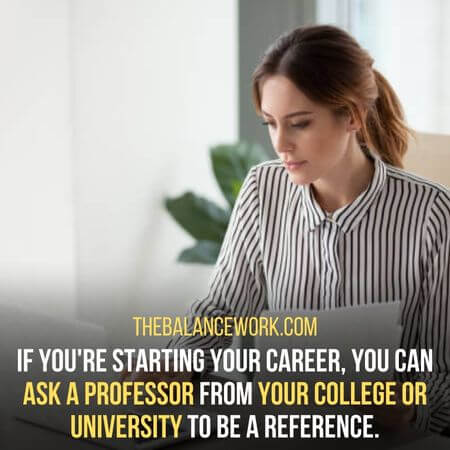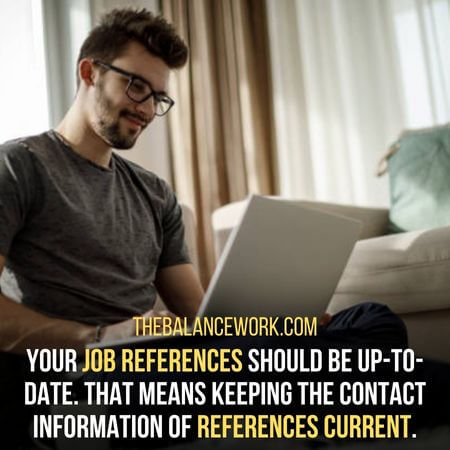How many job references should you have? The answer may surprise you. Most job seekers believe they should have at least three references when applying for a new position.
However, the number of references you should have depends on several factors.
How Many Job References Should You Have?
When job hunting, you need to be prepared with a list of references who can attest to your qualifications.
Let’s find out what the experts say about the number of references you should have.
1. The Type Of Job You’re Applying For:
The type of job you’re applying for will affect how many references you need.
For example, you’re applying for a senior-level position. As a result, you may be required to provide more references than if you were applying for an entry-level job.
Or are you applying for a job that’s in a different field? You may need to provide more references to show your transferable skills.

Some employers will also specify the number of references they require.
For instance, they may ask for three professional and one personal reference.
2. How Much Experience You Have:
If you have years of experience, you’ll have more references than someone who is starting.
While you may have references from previous jobs, you can also use co-workers, clients, or vendors as references.
And when it comes to how many years of experience you need to have references, that varies.
For instance, if you’re a recent college graduate, you may only need one reference.
But you may have several references if you’ve been in the workforce for ten years or more.
3. How Many Employers You’ve Had:
With each new job, you usually make new contacts. And as you move up in your career, you may have more opportunities to work with different employers.
So, if you’ve had several employers, you’re likely to have more references than someone who has only had one employer.
And with each new employer, you also have the chance to add new skills and experiences to your resume.
However, you can have more than one employer and still have a strong resume.
But if you have ample experience, having more than three references may be optional.
4. The Type of References You Have:
The type of references you have can also matter. For example, having a mix of professional and personal references. They can show that you’re well-rounded.
And if you have references from different industries, that can demonstrate your versatility.
Having all professional references may be more beneficial if applying for traditional job.
And if you’re applying for a job in a creative field, having all personal references may be more helpful.
Some employers prefer to see references who can speak to specific skills for the job.
5. How Many Contacts You Have:
The number of contacts you have can also be a factor in deciding how many references to include.
If you have a large network, it may be beneficial to list more references. In this way, potential employers can choose the references that will be the most helpful to them.
On the other hand, if you have a small network, it may be more beneficial to list fewer references. This way, you can focus on making sure that your references are high-quality.
In general, having at least three references and no more than five is a good idea.
Verdict:
So, how many job references should you have? The answer is it depends on your situation.
You may benefit from listing more references if you have a large network.

On the other hand, if you have a small network, it may be more beneficial to list fewer references. In general, having at least three references and no more than five is a good idea.
When it comes to job references, quality is more important than quantity.
So, focus on making sure that your references are high-quality and will speak good about you.
This way, you’ll make the best impression on potential employers.
Who To Ask For References?
Regarding job references, there are specific people you should ask.
Let’s find out who:
1. Your Previous Employers:
The first people you should ask for job references are your previous employers.
This is because they can speak to your work ethic and experience.
If you had a positive relationship with previous employer, they would be happy to help.
But, if you left your previous job on bad terms, it’s best not to ask them to be a reference.
2. Your Mentors:
They will make an excellent reference if you have a mentor in your industry.
This is because they can attest to your skills and experience.
Mentors are also typically well–connected. Therefore, they may provide you with valuable networking opportunities.
Your mentors can also provide you with advice on your career.
When choosing a mentor, pick someone you respect and who has achieved success in their field.
3. Your Professors:
If you’re starting your career, you can ask a professor from your college or university to be a reference.
They can speak to your ability to do research and write papers. With their help, you can get a job in your desired field.

Some professors may even be able to help you find a job after graduation.
Their guidance can be invaluable as you start your career.
And their reference can make a big difference when you’re applying for jobs.
When choosing a professor to be a reference, pick someone with whom you have a good relationship. And pick someone who you know will speak highly of you.
4. Family And Friends:
Although you may not want to, you can always ask family and friends to be referenced.
If you have a close relationship with them, they will likely be happy to help you.
Their reference may carry a little less weight than a professional reference. But it can still be helpful.
And make sure to let them know what kind of position you’re applying for so they can tailor their reference.
Some employers will also ask for personal references, so it’s good to have a few lined up, just in case.
5. Your Colleagues:
Colleagues can make great references, especially if you have worked closely with them.
They can speak to your professional skills and abilities. And they may also be able to provide insight into your character.
Colleagues have the potential to be some of the best references you can get.
They have in-depth knowledge of how you work. As a result, they can provide employers with details of your strengths and weaknesses.
Some employers may feel more comfortable speaking to a colleague than a friend.
6. Can You Ask Peers To Be A Reference?
Yes, you can ask peers to be a reference. It may be beneficial to do so.
Peers can provide employers with an objective perspective of your skills and abilities.
They can also offer insight into your character. Friends and family members might be unable to provide that.
And when it comes to asking for a reference, it’s always better to err on caution.
How Long Do Job References Stay On Your Resume?
Your job references should be up-to-date. That means keeping the contact information of your references current.
Also, remove any references that are no longer relevant to your career. For instance, you’re applying for a job as a web developer.
You don’t need to include a high school English teacher reference.

And when should you update your references? Any time there’s a significant change in your career.
That could be when you:
– Get a promotion
– Change jobs
– Receive an award or recognition at work
– Make a significant contribution to your organization
It’s always better to err on updating your references too often rather than rarely enough.
You don’t want a potential employer to call a reference only to find out the information is no longer valid.
If you have an updated reference on your resume, it creates a good impression.
How To Ask For A Reference?
Let’s say you’re applying for a new job and need to update your references. How do you go about asking someone to be a reference?
1. Send Them An Email:
The ideal way to contact a reference is by email. This way, you have a written record of your request (in case they forget).
And you can easily attach your resume, cover letter, and other relevant documents.
To write the best email possible, keep it short and sweet. Get to the point quickly by explaining who you are and why you need their help.
It’s also helpful to include a link to the job listing so they can get more context about your application.
2. Hit Them Up On LinkedIn:
LinkedIn can be a great alternative if you’re not comfortable emailing someone.
LinkedIn is all about networking. As a result, most people are open to connecting with others—even if they don’t know them that well.
When reaching out, include a personal message explaining why you want to connect. And if you have any mutual connections, be sure to mention them.
3. Follow Up:
Don’t just sit back and wait for a response. Instead, be proactive and follow up with your contacts a week after reaching out.
A simple “just wanted to make sure you saw my message” will do. And if you don’t hear back after your follow-up, it’s best to move on.
Final Word:
How many job references should you have (and who to ask)? Ideally, you should have three to five references.
That’s a good number to provide potential employers with. And it’s also a manageable number for you to keep track of.
You can ask co-workers, past employers, professors, or anyone else. They can attest to your work ethic and qualifications.
Ask them first if they’re willing to be a reference for you. And always keep your references up to date!
Last Updated on 9 hours by Shahzaib Arshad
- 7 Great Signs Your Boss Wants to Help You - October 8, 2023
- How To Explain Dropping Out Of Law School? Detailed Guide - September 6, 2023
- 10 Reasons Employees Get Fired in Workplace - August 27, 2023